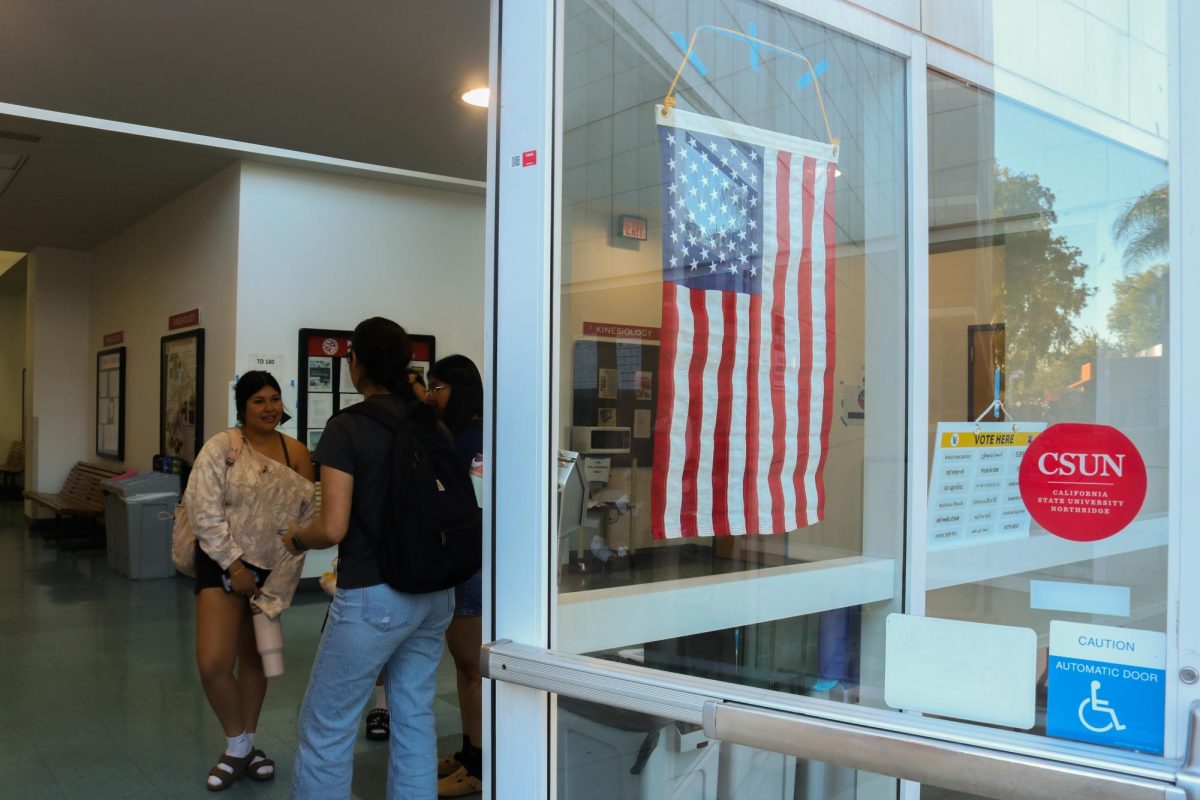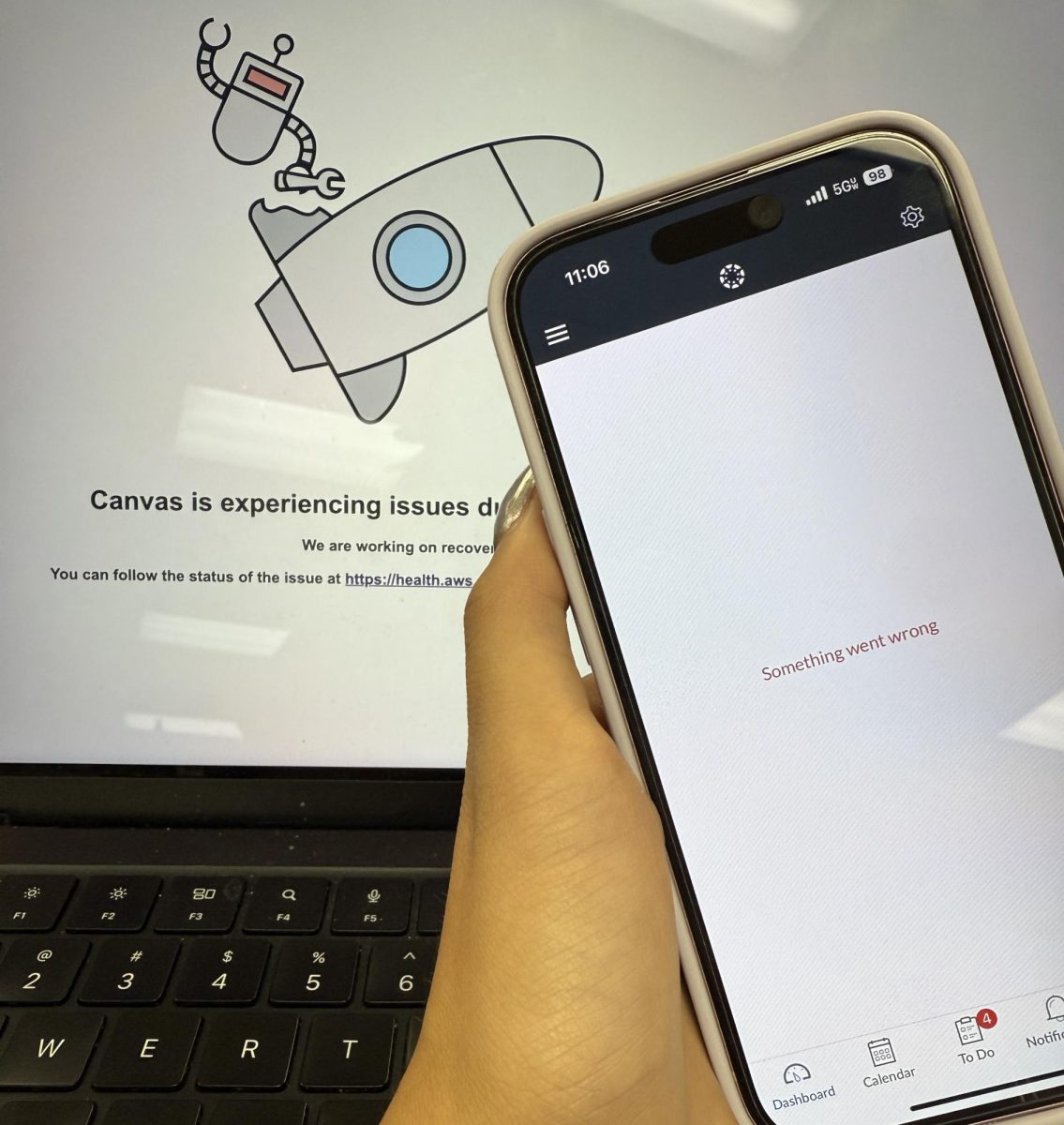April 2 through April 5 was World Wide Climate Justice Education Week at CSUN. With spring in full gear and Earth Day on the 22nd of the month, it’s the perfect time to appreciate and learn about nature, and what we can do as individuals and as a community to advocate for its preservation.
World Wide Climate Justice Education Week aimed to do just that. The week-long event began with an extra special Tuesday farmer’s market. In addition to the usual vendors and small businesses, there were environmentally-minded tables featuring plant milk tasting, voter registration, composting demonstrations and a climate-themed card game.
Go With the Flow, CSUN’s student-run Menstrual Equity Initiative, had a booth that highlighted the intersection of menstrual education and sustainability. Posters shared startling statistics: “Over 20 billion pads and tampons are discarded annually into landfills, which would take hundreds of years to decompose.”
Go With the Flow defines sustainable menstruation as “being mindful of the negative effects disposable hygiene products have on our environment to reduce the plastic waste that ends up in our oceans and our landfills.”
On Wednesday, students could attend a production of “Telenovelas in the Park” with Mujeres de la Tierra at the Grand Salon. According to the Mujeres de la Tierra website, Telenovelas in the Park defines itself as “a grassroots theater troupe that uses the traditional telenovela model to present key messages about the California drought, water conservation and the impacts of plastics pollution.”
Wednesday’s live telenovela was a hilarious yet informative narrative about the importance of caring for the earth and taking action to protect it. The performance was interactive; actors encouraged audience members to shout out replies. Irma Munoz, Founder/CEO/President of Mujeres de la Tierra, took to the stage afterward and spoke with the audience about her personal experiences with community advocacy and the importance of participation.
“Mujeres de la Tierra is a rebel organization,” Munoz said, referring to the organization’s approach to climate activism. “We don’t take no for an answer.”
Also on Wednesday was a farm-to-fuel nutrition class, where attendees took part in a sustainability-minded cooking class using locally sourced ingredients. Participants learned how to make mint lemonade, southwest veggie lettuce wraps, and Mediterranean pasta salad.
The meals were made partially using produce that was picked from the sustainability garden and the hydroponic farm on campus. A collaboration between three different departments, the class aimed to teach students how mindful cooking and community gardening can help reduce emissions and create nutritious, affordable meals.
On Thursday, Aspen Coty, a Sustainability and Zero Waste Coordinator at CSUN, led a campus sustainability tour with insight from Climate Corps Fellows and others from the Sustainability Institute. Students visited the hydroponic farm located in the University Student Union, where plants are grown in a liquid solution instead of soil to conserve water, energy and space.
The tour also examined some of the sustainability features of campus parking structures and the Student Recreation Center.
Friday held two events, the first being a food garden tour and service event. Here, G.A.R.D.E.N. experts led visitors on tours around the leafy oasis by the baseball fields. Established ten years ago, the G.A.R.D.E.N. is a campus sustainability hub containing fruit trees, edible plants, compost bins, and an outdoor community classroom.
The G.A.R.D.E.N. also grows a crop of milkweed, which is crucial to the growth of monarch butterflies. According to the G.A.R.D.E.N. tour guide, monarch caterpillars only feed on milkweed, which causes them to take on some of the plant’s toxic qualities. Because of this, birds don’t try to eat monarchs. Through this seemingly small act of planting milkweed, CSUN’s G.A.R.D.E.N. plays a part in creating a friendly space where monarch butterflies could someday get their staple food.
Shortly after the garden tour and service event was a screening of Disneynature’s “Penguins” in the Armer Theater with guest speaker and producer Ron Conli in attendance. Conli shared insights into the world of environmental filmmaking, from stories about harrowing arctic wind storms to the breathtaking natural beauty of the vast, largely uninhabited landscape.
“There are all kinds of shades of blue and pink in the ice that you never could imagine,” said Conli about visiting Antarctica for the production of “Penguins.”
“Penguins” follows a quirky Adélie penguin named Steve as he navigates the milestones that punctuate the species’ early adulthood — building a nest, finding a mate and raising a pair of baby chicks.
“We get accused of anthropomorphizing animals,” Conli said. “Really, we consider creatures as our equals.”
Conli mentioned that there is currently an overfishing event affecting krill, one of the Adélie penguins’ main food sources. According to Conli, krill is used to make protein powder.
In his presentation, Conli emphasized the importance of narrative storytelling when it comes to environmental filmmaking. With an engaging story, viewers can connect with the creatures on screen and maybe even become motivated to participate in their conservation.
“It’s through the heart that the mind actually opens,” Conli said.
CSUN’s commitment to sustainability doesn’t end after World Wide Climate Education Week. The CSUN Institute for Sustainability will host a Spring Cleaning Fair on April 16 in Matador Square and an Electric Vehicle (EV) Car Show on April 17. More events and updates are available on the CSUN Institute for Sustainability’s News & Events page.


















